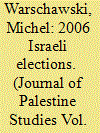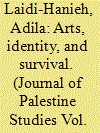|
|
|
Sort Order |
|
|
|
Items / Page
|
|
|
|
|
|
|
| Srl | Item |
| 1 |
ID:
074088


|
|
|
|
|
| Publication |
2006.
|
| Summary/Abstract |
This report looks at major trends shown by Israel’s March 2006 elections, despite the lowest voter turnout in the country’s history (fueled by disgust at corruption). Most important, the resounding defeat of the Likud and the Right in favor of the “center” confirmed a shift in political culture away from the Greater Israel ideology and permanent preemptive war against terrorism (i.e., the Palestinians) and the emergence of a broad consensus on unilateral separation (not peace), seen as the guarantor of security and normalcy. Also discussed are the early hopes raised by Amir Peretz’s election as Labor party head (and his subsequent domestication), the return of a certain discourse of social justice after years of uncontested neo-liberalism, and the durability of the “community” or ethnic vote. The letter ends with a look at coalition politics in Israel and the formation of the new government.
|
|
|
|
|
|
|
|
|
|
|
|
|
|
|
|
| 2 |
ID:
074087


|
|
|
|
|
| Publication |
2006.
|
| Summary/Abstract |
This personal account, by the first director (1996–2005) of the Sakakini Center in Ramallah, describes the rewards and difficulties of establishing and running an NGO dedicated to culture and the arts in occupied Palestine. In the process of recounting the story of the center—its vision and objectives, multidisciplinary programming, funding constraints, its efforts to develop a diversified audience, and the impact of the second intifada—the author touches on a number of broader issues. These include the NGO scene in Palestine, international donor agendas, the inevitable intertwining of culture and politics, questions of identity and survival, and the challenge of finding ways to impart meaning to the arts in a situation of scarcity and siege.
|
|
|
|
|
|
|
|
|
|
|
|
|
|
|
|
| 3 |
ID:
074086


|
|
|
|
|
| Publication |
2006.
|
| Summary/Abstract |
Since Hamas won the Palestinian legislative elections in January 2006, its political positions as presented in the Western media hark back to its 1988 charter, with almost no reference to its considerable evolution under the impact of political developments. The present article analyzes (with long verbatim extracts) three recent key Hamas documents: its fall 2005 electoral platform, its draft program for a coalition government, and its cabinet platform as presented on 27 March 2006. Analysis of the documents reveals not only a strong programmatic and, indeed, state building emphasis, but also considerable nuance in its positions with regard to resistance and a two-state solution. The article pays particular attention to the sectarian content of the documents, finding a progressive de-emphasis on religion in the three.
|
|
|
|
|
|
|
|
|
|
|
|
|
|
|
|
| 4 |
ID:
074089


|
|
|
|
|
| Publication |
2006.
|
| Summary/Abstract |
These excerpts are from the 36,000-word “life history” of Um Jabr Wishah, who lives in the al-Bureij refugee camp in the Gaza Strip; excerpts dealing with life in her village before 1948 appeared in JPS 138 (winter 2006). A future issue of JPS will carry Um Jabr’s account of organizing prison visits in the 1980s and 1990s.
Um Jabr describes what befell her family and fellow villagers during the 1948 war. Her account covers mainly the period between the conquest of her village, Bayt `Affa, during the Israeli army’s July offensive, and her family’s settlement in al-Bureij refugee camp outside Gaza City in 1950. Bayt `Affa, located between al-Majdal and Faluja, was within the area allotted by the UN partition plan to the Arabs but lay close to territory allotted to the Jews, notably the narrow corridor linking the coastal area to the north and the Negev area in the south (where some twenty-five mostly military Jewish settlements had been established, including twelve in one night about a year before the UN partition resolution). The Israeli July offensive and subsequent offensives against the Egyptian forces resulted in the conquest and annexation to Israel of the majority of the Gaza district’s rich agricultural lands, including forty-five villages. Um Jabr’s odyssey, compelled by the changing course of the fighting (typical of the experiences of tens of thousands of Palestinian refugees at the time) took her to one village after another. Um Jabr does not give dates, but from the evolution of the fighting it is clear that within the space of some three months, her family moved from Bayt `Affa to Karatiyya to Faluja to Barbara to Hiribya. It was probably during the latter part of October, when Israel launched its all-all assault code-named Operation Yoav, that the family fled to the besieged Gaza City, which became part of the Egyptian-administered Gaza Strip after the armistices of 1949.
Um Jabr’s “life history” is one of seven collected as part of an oral history project, as yet unpublished, of seven women living in various parts of the Gaza Strip who were old enough to have clear memories of the pre-1948 period. Each woman was interviewed a number of times, with the interviews being conducted in the second half of 2001; Um Jabr was in her early 70s at the time. After the tape transcripts were transcribed, the memories were set down exactly as they were told; the only “editing” was integrating details or elaborations supplied during subsequent interviews at the appropriate chronological place. The “life histories” were collected by Barbara Bill, an Australian who worked with the Women’s Empowerment Project of the Gaza Community Mental Health Program starting from 1996, and Ghada Ageel, a refugee from al-Bureij refugee camp now working on her Ph.D. in Middle Eastern politics at the University of Exeter in England.
|
|
|
|
|
|
|
|
|
|
|
|
|
|
|
|
|
|
|
|
|